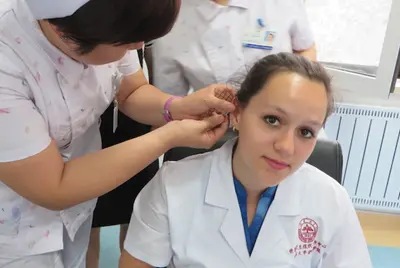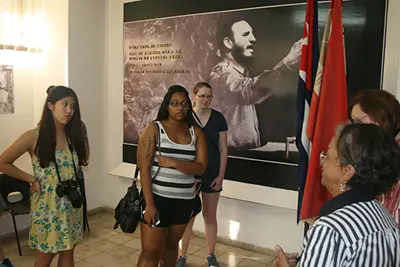Study-Abroad Course on Migration Sheds Light on Refugee Crisis

09/14/2016
By Ed Brennen
Studying immigration in the Czech Republic this summer didn’t really align with Mary Joens’ chemical engineering major. And that was just fine with the sophomore from Beverly.
For Joens, participating in the study-abroad program “Summer School of Migration in Prague,” led by Assoc. Prof. Jana Sladkova of the Psychology Department, is what the college experience is all about: the opportunity to explore diverse interests in ways that may never come along again.
“I had been following immigration issues at home and abroad in the news for a while, and the course seemed like a great opportunity to take a closer look from a new perspective,” says Joens, one of seven UMass Lowell students who participated in the six-credit course.
“It was my first time studying abroad, and it was a fantastic experience,” adds Joens, who was able to fulfill general education requirements with the course. “It definitely added much more nuance to my ideas of immigration and the refugee crisis in particular.”
This is the third time that Sladkova, a native of Prague whose research focuses on migration, has led the three-week program. It is run in partnership with the Czech Republic’s oldest higher education institution, Charles University, founded in 1348.
“Migration is such a huge issue around the world, and this enhances what the students learn because they are, in a way, immigrants for three weeks,” says Sladkova, whose students compared and contrasted the current issues of migration in the United States and the Czech Republic, examined case studies of particular migrant groups and explored the integration of migrants into their new communities.
The course also featured lectures from Charles University faculty, who shared new research on migration that Sladkova says was not yet available to the public.
“It was incredible to actually see the research being carried out right now and the current effects of the refugee crisis,” says Matt Laraba, a senior psychology major from Lowell.

In 2015 alone, more than a million migrants and refugees, primarily from Syria, Afghanistan and Iraq, crossed into Europe, according to the United Nations Refugee Agency. While countries like Germany, France and Italy have accepted the most immigrants, a divide has been created in the European Union over how best to deal with the crisis.
In the Czech Republic, students noted a somewhat vocal (and familiar) skepticism of open immigration.
“Given the current political divide in the U.S. regarding immigration policy, I would say the mood in the Czech Republic seems very clear,” says Elizabeth Mason, a senior psychology major from Billerica. “Many professors openly described the country as being xenophobic. The rest of Europe, however, seems to have different views, resulting in a political divide.”
Students’ classroom lessons were complemented by several daylong excursions, including visits to the Arabic community of Teplice and the Vietnamese community of Potucky. Students also attended a ballet performance at Prague’s National Theater and a classical music performance at the historic Smetana Hall and enjoyed a cruise on the Vltava River.
“It was absolutely amazing to see all the history,” says Laraba, who traveled on his own through Germany, France and the Netherlands for a week before joining the course in Prague. “It was nice being with the small class because it gave us more time to ask questions and have one-on-one discussions.”
Students agreed that most difficult part of the trip was the language barrier, which made having Sladkova by their side all the more helpful.
“It was nice having Jana there because she not only gave us ideas of where to go, but she also gave us the freedom to explore on our own,” Laraba says.
“It’s an exhausting trip, but in a good way,” Sladkova says. “It’s a joy to share the country with the students.”



